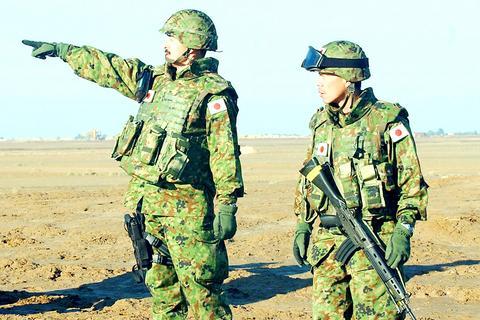Japanese soldiers, embarking into a conflict zone for the first time in a half-century, inspected the site of their future base in southern Iraq yesterday amid reports of a possible terrorist plot against them.
A group of about 10 Japanese troops drove up in four cars -- followed by hordes of reporters, TV cameramen and photographers -- to a muddy field outside this southern town where the camp will be built.

PHOTO: AP
They spent 20 minutes looking around before returning to the Dutch garrison at Camp Smitty where the 30-member Japanese contingent is based temporarily. The Japanese contingent will be 1,000 strong by the time it is fully deployed in March.
The noncombat group, comprising engineering and water purification units, will help purify local water supplies, rebuild schools and provide medical care in Samawah and surrounding areas.
Samawah lies about 230km south of Baghdad.
The troops arrived in southern Iraq late Monday overland from Kuwait.
Japanese defense chief Shigeru Ishiba yesterday told reporters in Tokyo that the government was investigating reports of a possible terrorist plot against the troops, based on unspecified information. He did not elaborate.
"We don't have the details, but such information should be investigated over there," Ishiba was quoted as saying by a Defense Agency spokesman.
"It is the advance team's mission to assess the local security situation," he said.
The Japanese army mission is the biggest for Japan's military overseas since the end of World War II and the first to be deployed in a war zone.
The dispatch has triggered widespread opposition in Japan with polls indicating a majority of the public believes the mission is too dangerous, or opposes it because it might violate the country's postwar pacifist Constitution.
Earlier yesterday, Japanese Chief Cabinet Secretary Yasuo Fukuda said the government was resolute in going through with its dispatch.
"We have responsibilities as a member of the international community. Without fulfilling those responsibilities, our country cannot exist," he said.
On arrival in Samawah on Monday, the commander of the advance party, Colonel Masahisa Sato, said his objective was to "collect information about the security relating to our activities" and to coordinate with humanitarian organizations active in the Samawah area.
Another officer, who identified himself only as Lieutenant Colonel Toshi, said: "Not last Samurai, first Samurai in Iraq ... Never kill any Iraqi people. I come here to shake hands."
Tokyo spent a lot of money supporting the 1991 Gulf War, but sent no troops, Afterward, Japan was criticized at home and abroad for relying on "checkbook diplomacy."
Residents of Samawah have mounted a grand welcome for the Japanese in the hope that they would bring jobs and put an end to the constant power outages and sanitation problems since the US-led coalition toppled the regime of Saddam Hussein last April.
"The Japanese make the best of everything," said Mohammed Ali Hussein, showing off a beat-up Sony Walkman.
"We are hoping they bring jobs, give us work and teach us ... I hear there will be construction projects," he said.
Welcoming banners in Arabic and Japanese have been strung up in markets. Merchants have stocked up on goods they hope the Japanese will want, sometimes making cultural miscalculations.
One shop owner was displaying cheese and cracker packs.
"I am told the Japanese like it," said Ahmed Abdul Hamid, 25, unaware cheese is unpopular in Japan.

ANGER: A video shared online showed residents in a neighborhood confronting the national security minister, attempting to drag her toward floodwaters Argentina’s port city of Bahia Blanca has been “destroyed” after being pummeled by a year’s worth of rain in a matter of hours, killing 13 and driving hundreds from their homes, authorities said on Saturday. Two young girls — reportedly aged four and one — were missing after possibly being swept away by floodwaters in the wake of Friday’s storm. The deluge left hospital rooms underwater, turned neighborhoods into islands and cut electricity to swaths of the city. Argentine Minister of National Security Patricia Bullrich said Bahia Blanca was “destroyed.” The death toll rose to 13 on Saturday, up from 10 on Friday, authorities

DEBT BREAK: Friedrich Merz has vowed to do ‘whatever it takes’ to free up more money for defense and infrastructure at a time of growing geopolitical uncertainty Germany’s likely next leader Friedrich Merz was set yesterday to defend his unprecedented plans to massively ramp up defense and infrastructure spending in the Bundestag as lawmakers begin debating the proposals. Merz unveiled the plans last week, vowing his center-right Christian Democratic Union (CDU)/Christian Social Union (CSU) bloc and the center-left Social Democratic Party (SPD) — in talks to form a coalition after last month’s elections — would quickly push them through before the end of the current legislature. Fraying Europe-US ties under US President Donald Trump have fueled calls for Germany, long dependent on the US security umbrella, to quickly

Local officials from Russia’s ruling party have caused controversy by presenting mothers of soldiers killed in Ukraine with gifts of meat grinders, an appliance widely used to describe Russia’s brutal tactics on the front line. The United Russia party in the northern Murmansk region posted photographs on social media showing officials smiling as they visited bereaved mothers with gifts of flowers and boxed meat grinders for International Women’s Day on Saturday, which is widely celebrated in Russia. The post included a message thanking the “dear moms” for their “strength of spirit and the love you put into bringing up your sons.” It

In front of a secluded temple in southwestern China, Duan Ruru skillfully executes a series of chops and strikes, practicing kung fu techniques she has spent a decade mastering. Chinese martial arts have long been considered a male-dominated sphere, but a cohort of Generation Z women like Duan is challenging that assumption and generating publicity for their particular school of kung fu. “Since I was little, I’ve had a love for martial arts... I thought that girls learning martial arts was super swaggy,” Duan, 23, said. The ancient Emei school where she trains in the mountains of China’s Sichuan Province